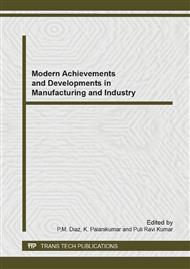p.792
p.800
p.807
p.819
p.831
p.839
p.845
p.850
p.855
Design and Development of Electronic Fuel Injection System for Vegetable Methyl Ester Operated DI CI Engine
Abstract:
The methyl esters of vegetable oils known as biodiesel are fetching more and more attraction because of the low environmental impact and potential as a green alternative fuel for diesel engine and they would not require significant modification of existing engine. Methyl esters of Jatropha (JME) are derived through transesterification process. Experimental investigations have been carried out to examine properties, performance and emission of different blends of JME. Result indicated that B20 have closer performance to diesel. The use of these methyl esters gives lower smoke, CO and HC but the Nitrogen Oxide emission is more. However to reduce the Nitrogen Oxide emission in diesel and various vegetable oil esters by lowering the combustion chamber temperature, Electronic fuel injection method is adopted. The study was carried out in a single cylinder 8 H.P running at 1800 rpm using the diesel, JME by the method of normal and Electronic Fuel Injection system and the result are compared between them. The result indicates that the Nitrogen Oxide emission is less for Electronic fuel injection method than the single injection. This helps to lower the combustion chamber temperature considerably, and hence the chance of generating the Nitrogen Oxide is minimized compared to the single injection.
Info:
Periodical:
Pages:
831-838
Citation:
Online since:
July 2014
Authors:
Keywords:
Price:
Сopyright:
© 2014 Trans Tech Publications Ltd. All Rights Reserved
Share:
Citation:


